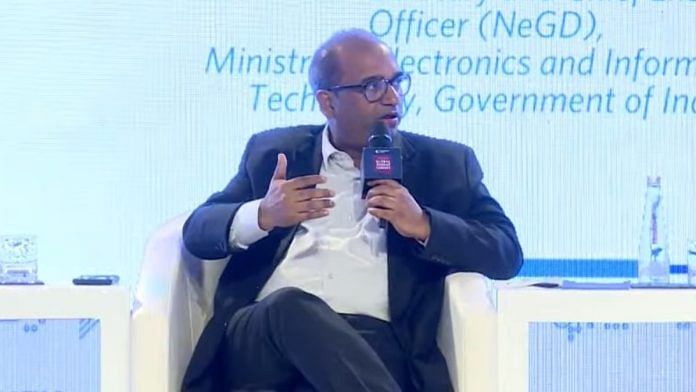New Delhi: Unless a global framework on Artificial Intelligence (AI) is agreed upon, the technology may be limited to certain companies and countries, limiting the potential advantages of AI, explained Abhishek Singh, at the Global Technology Summit organised Monday by the Ministry of External Affairs (MEA) and Carnegie India.
Singh, an additional secretary and chief executive officer of the National e-Governance Division (NeGD), Ministry of Electronics and Information Technology (MeitY), was part of a panel on the future of AI at the summit.
“The biggest risk is that we may keep on doing this debate of innovation and regulation. If it’s not globalised, if you do not come out with a framework, the technology may get limited to a few companies or a few countries and then we will not be able to leverage the potential advantages that we have,” Singh said during the panel discussion.
“What is also interesting is that the G7 Hiroshima process or the G20 declaration or the US guidelines or the UK AI Safety Summit at Bletchley Park – all of them have certain common elements. We need to bring all of these together,” added Singh.
He added that global collaboration is key to ensuring that big technology companies implement internationally agreed framework on the use of AI technologies.
Speaking to ThePrint on the sidelines of the summit, Singh pointed out that the Government of India will try to forge this consensus at the Global Partnership on Artificial Intelligence (GPAI) summit being held in New Delhi from 12 to 14 December, 2023.
GPAI is an international and multi-stakeholder initiative launched by 14 member countries and the European Union (EU) in 2020. The founding members are: Australia, Canada, France, Germany, India, Italy, Japan, Mexico, New Zealand, the Republic of Korea, Singapore, Slovenia, the United Kingdom, the US and the European Union.
Since then, 14 countries have joined the initiative including Brazil, Israel, Senegal and Türkiye.
Also Read: A new AI tool can predict if you’ll have a heart attack 10 years later, shows 1st global trial
Forging a global consensus
India is hosting the GPAI summit 2023, which includes a ministerial council meeting on 13 December to be attended by the ministers or deputy ministers from all GPAI members invited.
Speaking on India’s strategy for AI and global governance, Singh told ThePrint, “India’s strategy on AI has been to promote innovation while ensuring guard rails to prevent user harm. When you measure user harm we look at the lens from safety, security and building trustworthy AI.”
“Globally also whether it is the G7 Hiroshima Process of the G20 declaration or the Bletchley Park declaration or the UN advisory group work which is going on or the US regulations, all of them figure with the same thing. But we need to bring it under the consensus of one umbrella and try to have one global policy with regards to how the world is able to walk the tightrope of ensuring innovation and having light-touch regulation,” Singh added.
Certain principles — such as accessibility to compute, secure and accessible datasets, bias-free algorithms and assessment frameworks for AI solutions – require a global consensus, he emphasised.
“We are hoping that when we meet next week in Delhi the world will be able to come out with a declaration that will reaffirm the commitment to these principles,” Singh said.
On the domestic front, Singh explained that the government views AI regulation from the “point of user harm”.
“How do we ensure that any AI-based solution does not cause harm to the end user? How do we ensure that we make it safe, how do we ensure we make it trustworthy and how do we ensure we make it accountable? That’s the framework (for regulation) India is looking at,” he said.
(Edited by Amrtansh Arora)
Also Read: Celeb deepfakes just the tip, revenge porn, fraud & threat to polls form underbelly of AI misuse



